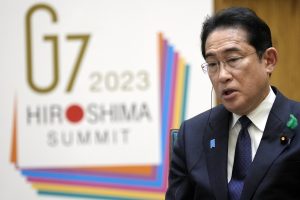From May 19 to 21, Hiroshima will be hosting the G-7 Summit. In addition to G-7 members, host nation Japan has invited leaders from outreach countries, including India, Brazil, Australia, South Korea, Vietnam, Indonesia, Cook Islands, and Comoros. In the lead up to the summit, the Japanese government has been vigorously debating the issues that it will try to address.
First and most important is united opposition to Russia’s invasion of Ukraine, affirming sanctions against Russia, and boosting support for Ukraine. Japanese Prime Minister Kishida Fumio made a point of visiting Ukraine prior to the summit to avoid being the only G-7 leader who had not done so. This G-7 will firmly reject any attempt to “change the status quo by force,” a veiled reference to keeping China in check.
Kishida will also have the role of keeping other leaders apprised of the tense security situation in East Asia. Japan’s strong involvement in the Ukraine crisis is motivated by an anticipated emergency in East Asia. Opposition to attempts to change the status quo by force will encourage the leaders of other developed nations to take an interest in East Asian security and step up their own involvement in the region. This is even more important in light of the recent divergence in opinions on China among Western leaders.
The second issue to address in Hiroshima is how to uphold the existing international order and bolster its validity and effectiveness. China will be at the forefront of this discussion as well. The key here will be winning support from the Global South with an emphasis on rule of law, rather than the values usually espoused by developed nations, such as liberal democracy. The term “rule of law” was a keyword at the Global South Summit held in India in January 2023, and it has the backing of the United States.
Third on the agenda is the responsibility of advanced nations for establishing the post-COVID international order, including revitalizing the economy and tackling global issues such as food, energy, climate change, and carbon neutrality. Economic security issues such as resilient supply chains will also be discussed, with the focus here once again on how to deal with China. Issues include areas such as carbon neutrality, which requires a collaborative partnership with China, and the dissection of technologies such as high-spec semiconductor components, bearing in mind the decoupling from China.
Finally, given that the summit will be held in Hiroshima, it will address the issue of nuclear weapons. The nuclear debate is shifting dramatically, with Russian President Vladimir Putin intimating that he might deploy nuclear weapons against Ukraine, and China and North Korea pushing forward with plans to significantly increase their nuclear weapons stockpiles in East Asia. The NPT-IAEA system is up against significant challenges and it remains to be seen whether a consensus can be reached and a statement issued. This will be a major task for the summit.
The meeting with the leaders of outreach countries slated for the latter half of the summit is also crucial. This time, the chair countries of other multilateral frameworks and major strategic countries have been invited, including G-20 chair India, African Union (AU) chair Comoros, ASEAN chair Indonesia, and Pacific Islands Forum chair Cook Islands. Given that the focus of the meeting is to determine whether the opinions of developed countries will resonate with the Global South, the second half of the meeting will be even more critical. There a great deal of skepticism toward developed countries, notably by Brazilian President Lula da Silva. The challenge will be to reach agreement on at least common rules, such as “rule of law,” with developed countries refraining from unilaterally imposing their values, instead maintaining an approach of tolerance and inclusiveness.
As its only non-Western member, Japan represents the diversity and tolerance of the G-7. The question is whether Japan can act as a bridge between developed countries and developing or emerging nations. Kishida will need to focus his efforts on coordinating the positions of delegates if he is to avoid a repeat of the 1979 Tokyo Summit, where then Prime Minister Ohira Masayoshi faced challenges dealing with stark divisions.

































